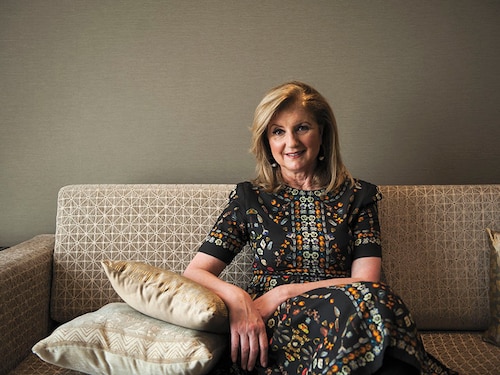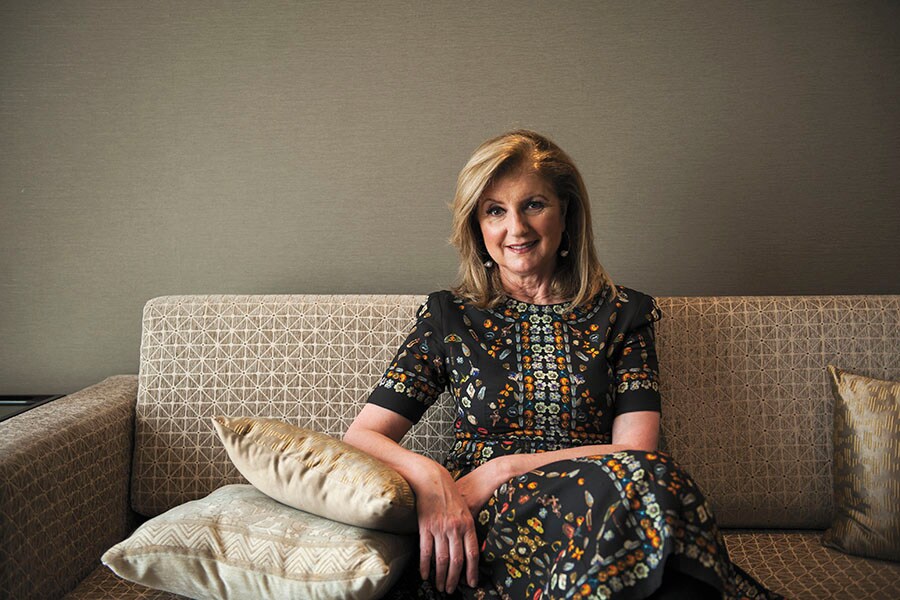The idea that you have to sacrifice your well-being to succeed is delusional: Ar
With Thrive Global, the former media entrepreneur is on a mission to upend the global stress and burnout "epidemic" by offering micro-solutions


 Arianna Huffington says her Thrive Global is launching an app that turns a smartphone into a dumb phone for specified periods
Arianna Huffington says her Thrive Global is launching an app that turns a smartphone into a dumb phone for specified periods
Image: Mexy Xavier
Since leaving the Huffington Post, a news and entertainment website she co-founded in 2005, Arianna Huffington, 67, has turned her attention to her wellness startup Thrive Global. Launched in late 2016 in the US, the company recently marked its India entry in partnership with Times Bridge, part of Bennett, Coleman & Co Limited. In an interview, she speaks to Forbes India about transforming our culture of overwork, the importance of sleep and redefining what it means to be successful. Edited excerpts:
Q. Your career has been marked by multiple reinventions. Starting off as an author to attempting a career as a politician to setting up The Huffington Post and now launching Thrive Global… Tell us about your own transformation from a fast-lane addict to a proponent of sleep and digital detoxing.
For me, it was a painful wake-up call when I collapsed from exhaustion in 2007. I hit my head on my desk, broke my cheek bone and was lying in a pool of blood. I was two years into building The Huffington Post, working 18 hours a day, seven days a week. I was divorced and had two teenage daughters. The incident prompted me to start studying the latest science on the need to recharge in order to be fully effective. I realised that we were living under the big delusion that in order to succeed we have to always be on and working 24x7. The truth is, we are much more effective if we take time to recharge and refuel.
Yet, hundreds of millions of people are suffering from burnout. In India, 80 percent of working professionals feel stressed at work, while 60 percent want to quit their jobs because of the stress [according to a 2016 TimesJobs survey]. We claim to be a data-driven society, but we’re ignoring the data.
Q. You’ve said that human behaviour can be changed through a combination of data and stories. How is Thrive Global working towards that?
Thrive Global helps people implement small behavioural changes that can help them improve the way they work and live, which in turn makes them healthier and more productive. The company has three areas of focus. The first is our work with corporations to help them change their culture so as to encourage well-being. We measure the impact of those changes on productivity, performance, attrition and health care costs.
The second is our media platform that brings together the latest science as well as ancient wisdom on how to live a good life. We also bring together role models to talk about how they sleep, meditate, take breaks, and how they’re not hooked to their phones all the time.
The third part is to create a suite of products so that we can digitise our intellectual property. We’ve set out eight pathways as well as hundreds of micro-steps to help people make positive changes to their lives. For instance, ‘well-being’ is a pathway that includes sleep, nutrition and exercise ‘wisdom’ includes mindfulness and meditation.
Q. Are Indian CEOs receptive to your line of thinking?
They are totally receptive. I was at a dinner sitting next to Vijay [Shekhar Sharma] of Paytm and he was incredibly wise about how he saw himself as an entrepreneur. He used the metaphor of being like a sustained sun, as opposed to fireworks that brighten the sky and then disappear. I’m finding a lot of wisdom among Indian people and we need to make it a part of conversation. This is what happened in the US only a few years ago—Marc Benioff of Salesforce talking about his regular meditation practice, or Ray Dalio of Bridgewater, who is also an investor in Thrive Global, talking about how meditation is essential to his success.
Q. But the belief that burnout is the price we must pay for success is pervasive.
I think what makes it easier is profiling the people who actually live the principles. And also raising awareness. I’m optimistic that there will be a culture shift. The idea that you have to somehow sacrifice your well-being and happiness to succeed is completely delusional.
Q. You’ve said that at the heart of our increase in stress and mental health problems is our addiction to digital devices. How can we embrace a healthier relationship with technology?
Technology is becoming increasingly invasive. So it’s a great time to ask the big questions: What is a good life? And how can we protect our humanity in the middle of this onslaught of technology? This is not to be anti-technology. This is simply to say that we need to set boundaries, otherwise we are going to be completely consumed by technology. So one of our eight pathways is ‘Unplug and Recharge’. Within that, the first micro-step is to turn off your phone before you turn off the lights and charge it outside your bedroom. We’ll also be launching an app to help us deal with our relationship with technology. It turns your smartphone into a dumb phone for specified periods of time and you can’t override it.
Q. You talk about “sleeping your way to the top”. How realistic is it to get 7-9 hours of sleep every night if you have a demanding job, kids and a house to manage?
If you have a sick child or a deadline, there will be times when you will not get the sleep you need. So the first question is what do you do on a regular basis? And the second is when you have to pull an all-nighter how quickly do you give yourself the time to refuel? Most people watch a lot of TV or spend a lot of time on social media. These are choices.
Q. You emerged as the public face of Uber through its cultural and boardroom crisis. Did you lose sleep over it?
(Laughs) I didn’t. I happened to be the only woman on the board when the crisis erupted, so I felt it was my responsibility to make it clear to employees that there was going to be an end to sexism, and that we were going to change the culture at Uber. I oversaw the internal investigation by former attorney general Eric Holder. The board adopted all 47 of his recommendations. I chaired the committee that looked for a new CEO and we are lucky to have Dara Khosrowshahi. Now with the SoftBank investment, Uber is emerging strong again.
First Published: Jan 24, 2018, 06:03
Subscribe Now